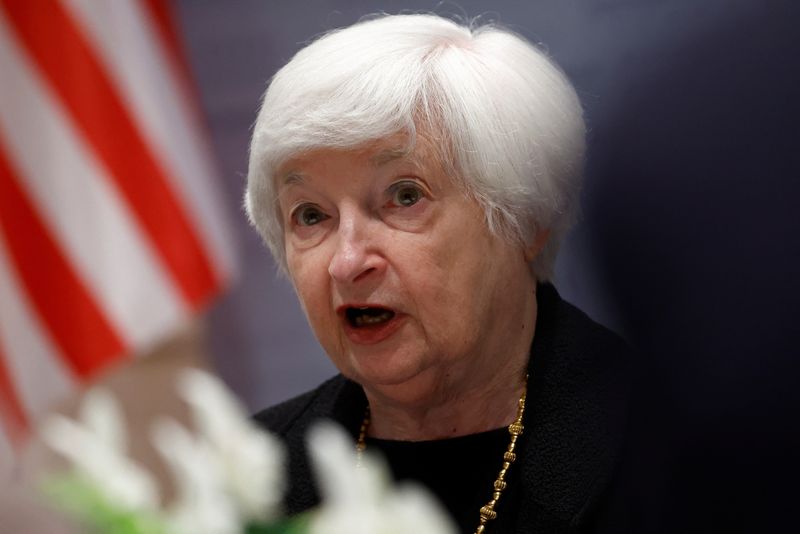Yellen to meet women economists in Beijing
2023.07.07 14:57

© Reuters. U.S. Treasury Secretary Janet Yellen meets with representatives of the U.S. business community in China in Beijing, July 7, 2023. REUTERS/Thomas Peter
By Andrea Shalal and Yew Lun Tian
BEIJING (Reuters) – U.S. Treasury Secretary Janet Yellen will meet with female economists in Beijing on Saturday, an effort to spotlight gender diversity following meetings with China’s largely male government leaders.
Yellen, the first woman to head the U.S. Treasury, has made women’s contributions and importance to economies a focal point of her tenure, often meeting with women economists and entrepreneurs during her travels, and hailing the benefits of boosting women’s participation in the workforce and leadership.
A senior Treasury official said the lunch with the Chinese economists would give Yellen, who was also the first woman to head the U.S. Federal Reserve, a chance to “interact with a number of people kind of outside the normal policy structure.” Treasury did not name the women participating.
Chinese President Xi Jinping’s decade as the party’s general secretary has seen the number of women in politics and top government roles decline and gender gaps in the workforce widen, with the government emphasizing more traditional roles for women.
A June report by the United Nations urged China to adopt statutory quotas and a gender parity system to boost women’s representation in government.
The UN Committee on the Elimination of Discrimination against Women found that women comprise just over 26% of deputies to the 14th National People’s Congress and since October have had no representation in the 24-member Politburo of the Communist party of China, a first in 20 years.
Currently, China’s top female politician is Shen Yiqin, who was appointed in March as one of China’s five state councillors. She ranks higher than a minister and oversees social welfare, veteran affairs and sports.
Yellen, by contrast, is one of 13 women in President Joe Biden’s 25-member Cabinet, the most gender-diverse in U.S. history.
One-quarter of the U.S. Senate and 28.7% of the U.S. House of Representatives seats are currently held by women, according to Rutgers University’s Center for Women in Politics.
China also lags in terms of women’s representation in the top echelons of industry, a recent study showed.
Bain & Company and leadership advisory firm Spencer Stuart reported in March that women account for only 19% of top business executives, compared to an average of 25% in leading countries.








